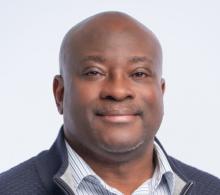Tell us about your business journey.
I had polio when I was five and it initially left me paralysed from the neck down. I made a partial recovery, so I can walk a bit but I need a wheelchair for distances. I developed post-polio syndrome, which causes chronic fatigue amongst other symptoms, whilst working as a finance manager. I had to leave my job – I wasn’t pushed, but I didn’t want to become a liability to my employer.
My options were limited as I needed something where I could work flexibly. That’s when I decided to teach myself basic web design as the Internet has always been one of my hobbies. I created a website called housesonline.com. It was a similar concept to RightMove, but I didn’t have the resources or the network to market it effectively. It completely failed.
I looked at ways I could market houses online cost effectively. I taught myself search engine optimisation (SEO). Back in 2000, not many people were talking about SEO, so advertising properties online wasn’t gaining traction as it was ahead of its time. I decided that I had two choices: I could go down the website design route or the SEO route. I went with SEO because I thought it would be valuable to businesses.
I set up one of the first digital marketing agencies in the UK, Easy Internet Services, but my issue was going out and pitching to businesses because of my disability and limited mobility. I contacted companies and offered to work for them for free in return for a testimonial. I got their sites to the top of the search engines. I then contacted another set of companies, but this time I only asked for payment when I got results.
I created my business on a credit card, but within a year, I was making more than I was in my previous job. Within two years, I was starting to employ people. We scaled up quickly and started to work with big brands like The Guardian, The Co-Operative and Amstrad.
In 2004, I spotted another gap in the market and established Easy Internet Solutions, which was the largest web hosting provider in the UK at the time, and we’ve evolved and grown the company since then.
How did you find the shift from employee to business owner? What barriers did you face?
A lot of people think that because I’ve got a Master’s degree in Business Administration, I use that knowledge. But that’s about strategy and business planning, so I definitely learned on the job. For example, when I tried to get a business loan, I was laughed out of the bank by someone I knew, because they told me I didn’t have any business experience.
I found that business support services didn’t understand the additional layer of challenges that a disabled person faces in business. For instance, when you can’t stand for long or you’re in a wheelchair, it’s not easy and the dynamics change. We need more business support that has a better understanding of the additional needs of someone with a disability.
There’s also a massive credibility gap because of discrimination, disability bias and the disconnect between people’s thinking about someone who is in business and someone who is disabled. I’ve sometimes had people ask me additional questions about whether I set up my businesses on my own.
Despite the challenges, what’s your favourite thing about being a business owner?
My favourite thing is the flexibility that it gives me, especially as someone with a disability. Even if I work a 60-hour week, I’m able to work on a flexible basis, rather than from nine to five.
What advice do you have for someone looking to start their own business?
I think it’s so important to find a mentor who understands your needs, which is why I set up The Circle Foundation to address some of these issues and provide targeted support for disabled people wanting to start their own business in the East Midlands. We provide finance and a business support network, including lawyers, marketing specialists and accountants.
We’ve already had a successful case study at The Circle Foundation. Two years ago, I set up a social enterprise and disabled access consultancy called Access Rating CIC with my co-founder, Richard Copson. We created an app that allows disabled people to submit disabled access reviews about public venues across the UK. My co-founder is now going to be taking over as the CEO and we’ve already been nominated for two business awards. I’ve been able to help him develop his business skills.
You’ve won many awards yourself. What is the secret to long-term success in business?
Not giving up. There are lots of times when I’ve wanted to give up, but it’s the tough times that make you stronger. As you face these challenges, your resilience grows. Over the years, I’ve managed to build up my resourcefulness too.
How does it feel to have been recently awarded an MBE?
It was phenomenal and I was humbled by it. It felt good to have my work recognised and it validated the work I still want to do with The Circle Foundation.


